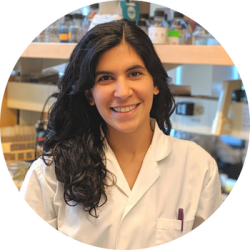Patrick Lajoie, PhD
Career stage
Associate Professor
Affiliation
Western University
Web link(s)
Bio
Fungal pathogens, transcription, stress responses, drug resistance
X: @patounet80
X: @patounet80

Linda Horianopoulos, PhD
Career stage
Postdoc
Affiliation
Affiliation: Currently at University of Wisconsin-Madison, but future professor at University of Guelph
Bio
Linda studies variation in metabolism and stress responses across different yeast species and seeks to understand how we can take advantage of yeast metabolism for the betterment of society. This can include harnessing yeast metabolism for bioproduction of foods, beverages, fuels, or other valuable products or targeting divergent components of yeast metabolism to thwart pathogenic yeasts.
Socials: @linder-surprise.bsky.social
Socials: @linder-surprise.bsky.social

Oualid (Walid) Ellouz, PhD
Career stage
Research Scientist
Affiliation
Agriculture and Agri-Food Canada
Web link(s)
Bio
Biodiversity and genomic dynamics of fungal–plant interactions, including the detection of pathogenic and symbiotic fungi and the development of integrated management strategies to support plant health and sustainable agriculture.

Jianping Xu, PhD
Career stage
Professor
Affiliation
McMaster University
Web link(s)
Bio
Ecology and Evolutionary Genetics of Fungi. The overall objective in our research is to understand how fungi evolve. We examine both the patterns of fungal evolution as well as the mechanisms responsible for the observed patterns of evolution. We study fungal communities and populations from the environment, human, animal, plant, and fungal hosts, clinics, and the laboratory to address a variety of issues such as the rates and effects of spontaneous mutations; the persistence and spread of mutations in natural environments and anthropogenic populations; and the origins of novel traits, genotypes and species.

Viola Halder
Career stage
Postdoc
Affiliation
Yale University, Townsend Lab
Bio
Grad student in the Shapiro Lab at UoG, working with Candida albicans, to determine how stress response genes within the pathogenic fungus interact with each other, using Crispr to create stress response mutants.

Brent Robicheau
Career stage
Assistant Professor
Affiliation
University of Prince Edward Island, Biology Dept.
Bio
Brent is interested in the genetics, genomics, and biodiversity of organisms that reside in coastal regions. Research areas include the mitochondrial genomics of bivalves and fungal endophytes, the characterization of marine microbial community dynamics both spatially and temporally (for e.g., fungi, archaea, bacteria, and eukaryotic phytoplankton), and the biodiversity of phytoplankton and diazotrophs in the North Atlantic and Arctic sectors.
Twitter: @B_Robicheau
Twitter: @B_Robicheau

Allison Walker
Career stage
Professor
Affiliation
Acadia University, Department of Biology
Web link(s)
Bio
marine fungi, endophytes, ecology, systematics, conservation
BlueSky: https://bsky.app/profile/fungaldreamteam.bsky.social
BlueSky: https://bsky.app/profile/fungaldreamteam.bsky.social

Body
